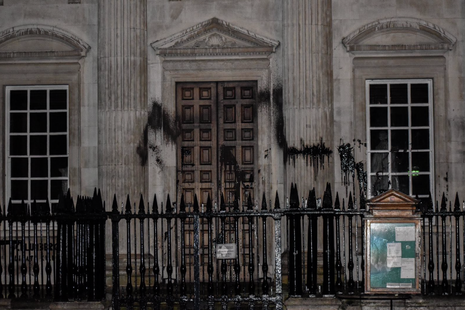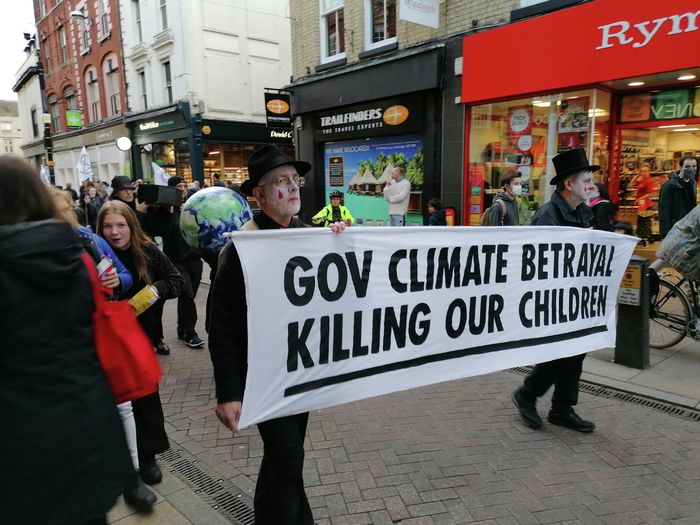Senate House splashed with black ‘oil’ by XR activists
The activists seek to remove the fossil fuel service company Schlumberger from the University by 2022

Last night (15/01), activists from Extinction Rebellion Cambridge sprayed fake oil on Senate House in a new campaign against the University’s links to oil company Schlumberger.
Fake oil was sprayed across the University’s governing building and “SCHLUMBERGER - CLIMATE KILLERS - CUT TIES NOW” stencilled on it. On the same night, activists from Extinction Rebellion Buddhists stencilled “CLIMATE EMERGENCY CENTRE” on the Schlumberger Gould Research Facility, located on the University’s West Cambridge Site.
In an email to Varsity, the group described the campaign’s objective to remove Schlumberger, the world’s biggest fossil fuel services company, from Cambridge by the end of 2022.
The groups claim that the University’s links to Schlumberger are giving the oil company an easy way for its activities to appear socially acceptable by associating itself with the University’s prestige and reputation for academic excellence.
One activist, Patrick, a mechanical engineer, said: “We know this action is going to cause some controversy, but we ask people to consider this: if you’re angry that fake oil has been sprayed on the old and beautiful Senate House, how do you feel about the real, toxic oil being spilled over our much older, more beautiful, and more fragile planet?”
“How do you feel about one of [the] most respected universities in the world working with a company that has over 36,000 patents in oil and gas technology to facilitate extracting the dirtiest fossil fuels? This is happening while the University’s own climate scientists tell us we can’t extract a drop more oil without causing catastrophic climate breakdown.”
Last year the University was commended at the Green Gown Awards UK for its approach to reduce emissions by 2030. On the recognition, Professor Toope commented: “This celebrates our collective progress and bold strategic direction, while also looking to a net-zero future for the University that puts resilience, innovation and partnership at its heart.”
The activists say that despite the University claiming leadership on the climate crisis, for instance by launching initiatives such as the new Cambridge Institute for Sustainability Leadership (CISL), this is undermined by continuing to host, accept money from, and work with oil and gas companies.
They say that neither the University’s nor the fossil fuel companies’ net-zero campaigns can be taken seriously while they work on new fossil fuel extraction and research to fuel their capitalist business models. To highlight this, the activists also changed the sign saying “This is not an ordinary project, but it needs to be” on the CISL building to say “This is not an anticapitalist project, but it needs to be”.
In addition to removing the oil company from Cambridge, the campaign calls for Schlumberger to be barred from student recruitment events; the company to lose its sponsorship of academic posts at the University; the Schlumberger building to be turned into a climate emergency research centre; the company to cease its operations; and the company to commit to reparations for the harm it has caused over its many years of fossil fuel extraction.
The new campaign comes amidst increasing pressure on individual colleges to divest, a call which has seen many colleges make changes to their investments. In November Fitzwilliam college pledged to no longer invest its discretionary investment portfolio, valued at around £50m, into the fossil fuels, tobacco, or defence sectors.
A University spokesperson told Varsity that “While we respect the right to peaceful protest, we condemn in the strongest terms any damage done to University property.”
The spokesperson went on to defend the University’s record, saying that “Cambridge published its relationships with energy companies at the start of the COP26 global climate change talks in Glasgow to show how we are working with partners to accelerate progress to renewable or decarbonised energy.”
“We hope this will spur further action, engagement and debate on the urgently needed steps for a transition to a sustainable future.”
This article was updated at 14.39 on 15/1 to include comment from the University of Cambridge
 News / Judge Business School advisor resigns over Epstein and Andrew links18 February 2026
News / Judge Business School advisor resigns over Epstein and Andrew links18 February 2026 News / Hundreds of Cambridge academics demand vote on fate of vet course20 February 2026
News / Hundreds of Cambridge academics demand vote on fate of vet course20 February 2026 News / Petition demands University reverse decision on vegan menu20 February 2026
News / Petition demands University reverse decision on vegan menu20 February 2026 News / CUCA members attend Reform rally in London20 February 2026
News / CUCA members attend Reform rally in London20 February 2026 News / Caius students fail to pass Pride flag proposal20 February 2026
News / Caius students fail to pass Pride flag proposal20 February 2026











